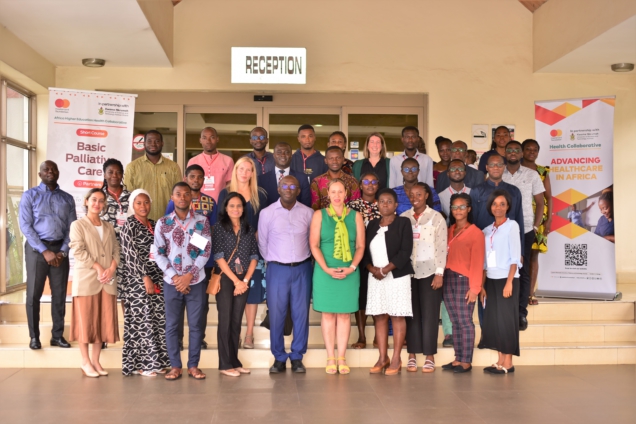In a bid to provide quality healthcare for patients with serious illnesses, such as cancer, the Mastercard Foundation Africa Higher Education Health Collaborative has organised a course in basic palliative healthcare for health personnel.
This course will equip 20 selected health personnel from across the country with the requisite skills to provide specialized medical care for such patients.
The workshop is in partnership with the Kwame Nkrumah University of Science and Technology, University of Toronto and the Ministry of Health.
The programme is under the Health Employment pillar of the Mastercard Foundation Africa Higher Education Health Collaborative.
The Health Employment pillar aims to expand and improve current capacities to train primary healthcare workers.
A facilitator, Prof. Mawuli Gyakobo of the Department of Internal Medicine and Therapeutics, University of Cape Coast, observed some shortfalls in palliative care in the country.
“We also observed some of the misapplication of some opioid drugs across the country, and this was quite disturbing and so we thought that there was a huge gap to be filled if we had to give quality care to our patients across the country.
“The gap is still wide and we have not been able to fill out many of them, “ he said.
Dr. Jennifer Wilson of the Department of Family and Community Medicine at the University of Toronto was optimistic of the positive impact of the training.
“I know that this training is going to be something that is going to impact you, inspire you, equip you so that you can return to help your people,” she said.
The Dean of the KNUST School of Public Health, Prof. Samuel Newton commended the Mastercard Foundation Africa Higher Education Health Collaborative for the initiative.
“We are really grateful, Mastercard has made a big difference in the school of public health and we hope that in these few days we can still do better by learning from the others who have joined us,” he said.
The Africa Higher Education Health Collaborative in partnership with the Mastercard Foundation seeks to advance healthcare in Africa through three pillars: Health Employment, Health Entrepreneurship and Health Ecosystem.
The Health Entrepreneurship pillar aims to develop an entrepreneurial mindset and culture that supports entrepreneurs to create meaningful innovations and employment opportunities in the health sector.
The Health Ecosystem pillar also aims to train and prepare a new generation of talented professionals with the broad sets of skills required to drive equitable and inclusive growth.
Latest Stories
-
Which will you vote for in 2024 Election: Honesty, Character, or Campaign Promises?
3 hours -
The ball is in Iran’s court after US pressure pays off
4 hours -
‘Japa’ sweeps Nigeria’s hospitals
4 hours -
Obuasi: Catholic Voices GH choral peace concert unites NPP, NDC
4 hours -
Lordina Supports NDC campaign in Ketu North with donation of medical equipment to Afife Health Centre
4 hours -
MTN Foundation delivers crucial technology tools to Eastern Regional Hospital
4 hours -
Galien Forum Africa: Enhaning African women’s role in climate and environmental crises
10 hours -
7th Galien Africa Forum ends with emphasis on health, innovation, and climate action in Africa
10 hours -
Ruthless Barcelona thrash Real Madrid to go 6 points clear
11 hours -
National Farmers’ Day scheduled for November 8
11 hours -
Samson’s Take: Why over 75% vote but only 5% join protests
12 hours -
Krachi East Chiefs applaud Bawumia for campaigning on issues with evidence
13 hours -
National Security Ministry dismisses Reuters’ claims that militants are using Ghana as logistical base
13 hours -
BOST and its CEO win big at 8th Ghana Energy Awards
15 hours -
Accused person in protest over alleged $3m BOST scandal discharged
15 hours

